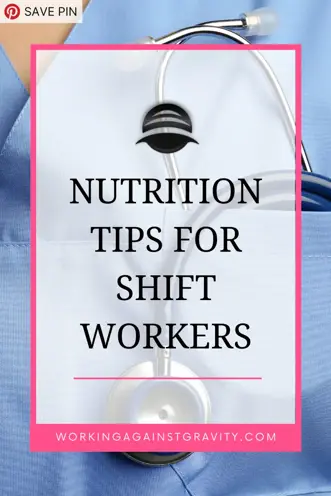
Are you a shift worker? If so, you probably know the struggles of meal timing, hunger spikes (and falls!), and energy dips that come with overnights, long shifts, and an overall wonky schedule. Nutrition for shift workers can be tricky. Don’t worry; we’re here to help.

What is Shift Work?
“Shift work” refers to a schedule outside of the typical “9 to 5”. This includes nurses, doctors, emergency medical services workers, firefighters, pilots, flight attendants and airline personnel, industrial workers, those in call centers, and many, many more.
These professions can involve 12-hour shifts, overnight shifts, broken-up shifts, or even working for 48 to 72 hours straight.
These professionals have careers that challenge them, and the schedule itself can also present some nutritional speed bumps outside of the “work day” or “work night.”
Advertisement
When it comes to overall health and nutrition, here are some key challenges that working in shifts can present.
- Difficulty planning meals and snacks
- Limited time to eat or drink during shifts
- Easy access to breakroom snacks and calorically dense foods with low nutritional value
- Trouble navigating the transition from workdays to days off
- Disrupted sleep patterns
Let’s break down some of the ways this can impact your body before we dig into some nutritional tips and tricks for shift workers.
Does Shift Work Affect Your Hormones?
Your natural circadian rhythm is thrown off when you go to bed in the sunlight and stay awake at night. Then, throw in the general lack of sleep seen during longer shifts, and you’ve got the recipe for potentially unhappy hormones.
Sleep deprivation and disruption to the circadian rhythm can impact two key hormones: melatonin and cortisol. Let’s look at them…
Melatonin is produced in your brain as a response to darkness. So when you are exposed to light at night or when you are sleeping when your brain would not typically produce melatonin, you might not produce as much.
Advertisement
Cortisol is a stress hormone. When it works efficiently, it helps control blood sugar levels, regulate metabolism, help to reduce inflammation and assist in forming new memories. Unfortunately, shift work can cause the body to produce too much cortisol, which can negatively impact your body. Too much cortisol puts your body in a “fight or flight” state.
Hunger Hormones and Shift Work
Many people who work shifts will find themselves constantly hungry, not satiated by the meals they’re eating, and drawn to calorically dense foods that provide very little nutritional value.
Lack of regular, restful sleep, which often comes as a product of shift work, impacts two more hormones: Ghrelin and Leptin.
- Ghrelin is known as the “hunger hormone” because it stimulates our appetite and helps us feel hungry. Think “stomach grumble ghrelin,” and it will be easy to remember! Eating when hunger is non-existent isn’t fun or enjoyable, so you need some ghrelin in your body. Those who do shift work can sometimes produce too much ghrelin, which can lead to never feeling full or satiated and, therefore, overeating.
- Leptin is produced by fat cells and helps regulate fat storage, appetite, and metabolism. When you are not getting enough sleep—quality or quantity—the body produces less leptin. Leptin helps you feel full, and with less of it, you feel more hungry, more often.
Hormones play a really important role in your body. As we’ve mentioned, the sleep cycles and routines that often accompany shift work can impact those hormones and throw them out of whack.
Advertisement
Healthy Eating Plan for Night Shift Workers
All of this information can sound really daunting and may be. If you’re a shift worker, you may think, “How can I beat this and continue prioritizing my health, nutrition, and fitness goals?”
As a shift worker, it can be challenging to maintain a schedule in ALL areas of life. If you let it, shift work can control sleep, schedule, body functioning, and so much more.
This doesn’t have to be the case.
There are some careers where working in shifts might be unavoidable, and we want to support you in doing what you LOVE to do.
So, we’ve put together some tried-and-true tips to help you (or the people in your life who work shifts) continue to prioritize your health and your goals. We are here to be the bearer of good news and tell you that there are many things that you can do and focus on to prioritize yourself and feel your best!
Advertisement
Nutrition Tips for Shift Workers
Plan Ahead
Prioritizing health and working towards specific fitness and nutrition goals can be hard. In fact, working towards any goal can be challenging!
Every individual faces challenges on their way to their goals and as a shift worker, you likely will have additional ones, especially when it comes to nutrition. One of the best things you can do is to be prepared ahead of time with your own snacks and meals that fit within your nutrition plan.
- Pack protein. This will help stabilize your blood sugar levels and give you a steady supply of energy during your shifts. Some examples are Greek yogurt, protein powder, jerky, protein bars, or hard-boiled eggs. Here are a few more!
- Incorporate high-fiber and high-volume foods. Bring pre-cut fruits and veggies and pair them with lean protein to keep you feeling full and satiated. This will keep the energy high and hunger under control throughout your shift. Some examples are baby carrots, mini peppers, cherry tomatoes, precooked or raw broccoli/cauliflower, celery, and cucumber. Pair with an example from above!
- Focus on balancing out your meals (when you can!). Aiming to have protein, carbs, and fat in every meal and snack. Some examples are hard-boiled eggs and fruit, a wrap with some deli meat, cheese, veggies, oatmeal and chia seeds, or nut butter, or some shredded chicken, rice, avocado, and your favorite veggies.
- Grab a smoothie! Smoothies can be a great option when you are in a pinch or short on time. Some go-to smoothie ingredients are frozen fruit, protein powder, Greek yogurt, chia seeds, nuts, and spinach or kale!
- Build a “snack pack.” This involves a variety of quick and easy snack-type foods that are similar macros to a typical, balanced meal but in easy-to-grab-and-eat snack form. You can pre-track your snack pack, graze on it throughout your shift and know that it will help you hit your nutritional goals if you finish it up! If any is left at the end of your shift, weigh it out, subtract it from your macros/plan, and add more fuel when you get home or finish it on your drive home.
Aim for a Regular Meal Schedule As Much As Possible.
Although shift work can be very disruptive to your schedule, you can still develop a regular meal schedule for work days and off days, too!
Adjust your schedule
During a typical day, when you sleep at night, you might have meals at 7 am, 10 am, 1 pm, 4 pm, and 7 pm. With shift work, shift this schedule! If you wake up at 6 pm and start work at 9 pm, you might aim for meals at 7 pm, 11 pm, 3 am, and 7 am or 8 am prior to heading to bed. If you are able to follow this schedule on a regular basis, your body and hormones will likely adjust.
Advertisement
Try "48-hour macros” on overnight shifts.
This means combining two days of macros into a 48-hour period if you’re awake and asleep at times that make it tricky to eat in a normal 24-hour cycle. Double your macros for those two days and aim to finish them up within the 48-hour period without worrying about which day they fall on.
Using 25-35% of the next day’s macros during an overnight shift works best for most people. This works well when you have a really long day when you are awake, followed by a day when you are awake for a very short time.
Notice patterns
If there are times when you usually feel a bit off or nauseous or when eating is challenging, you can plan accordingly. Perhaps you get a good chunk of your macros in prior and use that time to focus on your water intake.
Make Hydration (and Especially Water!) a Priority
When you work late night shifts or multiple days at a time, it can be easy to fall into the trap of consuming multiple caffeinated beverages, not drinking much water, or a combination of both. Staying hydrated not only keeps you feeling better and more alert but being mindful of how much caffeine you drink and when you drink it can also help improve your sleep.
- Remember that coffee, caffeinated teas, and energy drinks are okay to have, but we recommend consuming them as you might on a “regular” day. If possible, limit caffeine to the first half of YOUR “day” (as in, the time you’re awake!) so it doesn’t impact sleep.
- If necessary, set a timer on your phone, Fitbit, or smartwatch to remind you to drink water. A water bottle with a straw attachment can make it even easier to sip throughout the day!
- If drinking during your shift is a challenge, find opportunities in your day when you can prioritize your hydration. This could be aiming for a chunk first thing when you wake up, sipping on a bottle on your drive to work, or drinking a bottle during your workout… as long as it isn’t shortly before bed! **Pro tip: leave an extra-full water bottle in your car so you always have some with you!
- If flavored seltzers or flavored water are your jam, those can be great options, too. The important thing is that we are aiming to drink as much water as you would if you were awake on a typical schedule and day. Also, keep an eye on digestion and bloating. Lots of bubbles can bother some people’s stomachs!
Dial-in Your Sleep Routine
Getting high-quality and quantity zzz’s might take a bit more time and effort as a shift worker, but it can be done, and many things are within your control. When it comes to sleep, some things that we have found to be helpful are:
Advertisement
- If possible, don’t get a workout in, and then try to go straight to bed. Even just an hour or so to eat and wind down after a workout before bed can help.
- Have a bedtime routine, even if it is during the day. This might involve routines like brushing your teeth, showering or washing your face, reading a book, journaling, or a mindfulness/meditation activity. If you don’t have a routine before going to bed, this can be a great time to create one!
- Make sure that your environment is optimal for sleep. For most people, this means keeping the room dark and cool. Blackout shades, an eye mask, and a fan are some easy ways to do this—especially if you’re trying to sleep during the day.
- Block out any noise that might make it hard to fall asleep or wake you up from sleep. Complete silence through earplugs can work for some, while others might prefer a fan or a white noise machine.
- If aiming for 8 hours of sleep doesn’t seem to work for you, that is okay. If your schedule allows, sleeping for a few hours, having a few hours of wake time around the house and then going back to sleep is better than nothing.
Define Success in a Way That Works and Fits YOU
Many of us (okay, pretty much all of us!) feel the need to be “perfect” with our nutrition on work days and off days. This often leads to falling into that “all or nothing” trap and can make us feel like we are unsuccessful when things don’t go as planned.
At Working Against Gravity, we know that being perfect isn’t realistic and puts unnecessary pressure and stress on ourselves. We recommend:
- Start with simple goals. If you have a hard time eating at all during your shift, perhaps your only goal is to eat at least one meal or snack and then build from there.
- Let the times when things don’t go as planned roll off your back. Maybe you have a couple of bites of the cookies that are in the breakroom. This happens sometimes, but it doesn’t mean the rest of your day is completely washed. Think about it like getting a flat tire. If you pull over with a flat, it doesn’t make sense to slice the other three, right? Return to your usual routine at that next meal or snack, and finish the day strong!
- Remind yourself that you don’t have to do everything at once. Pick ONE thing to start with (ex. meal planning, prioritizing sleep, dialing in water intake), repeat it until it is a habit and then build from there. If you focus on super small improvements each day, you will be amazed at how that can add up over the course of a month, a year and longer.
When it comes down to it, prioritizing your health and nutrition goals while working shifts can be challenging. But that doesn’t mean it is impossible, and you don’t have to do it alone.
WAG Coaches have worked with hundreds of shift workers to help them navigate their unique challenges and find the best plan for them. Nutrition is not a “one size fits all” thing, and we are here to help you or the shift worker in your life find what works best for you.
References:
- Costello, Rebecca B et al. “The effectiveness of melatonin for promoting healthy sleep: a rapid evidence assessment of the literature.” Nutrition journal vol. 13 106. 7 Nov. 2014, doi:10.1186/1475-2891-13-106
- Li, Jian et al. “Impact of shift work on the diurnal cortisol rhythm: a one-year longitudinal study in junior physicians.” Journal of occupational medicine and toxicology (London, England) vol. 13 23. 14 Aug. 2018, doi:10.1186/s12995-018-0204-y
- Cibele Aparecida Crispim, Jim Waterhouse, Ana Raimunda Dâmaso, Ioná Zalcman Zimberg, Heloisa Guarita Padilha, Lila Missae Oyama, Sérgio Tufik, Marco Túlio de Mello, Hormonal appetite control is altered by shift work: a preliminary study, Metabolism, Volume 60, Issue 12, 2011, Pages 1726-1735, ISSN 0026-0495, https://doi.org/10.1016/j.metabol.2011.04.014. (https://www.sciencedirect.com/science/article/pii/S002604951100117X)
Nicole Kupfer
Schedule a Free Intro Call
Working Against Gravity has led the macro tracking and health space for over a decade. Our team doesn’t just understand the science of nutrition—we’ve spent years mastering the art of tailoring it to fit your life. That means no cookie-cutter plans, just real strategies that have worked for over 30,000 people.
Schedule a free call with our team to learn how working with a 1-on-1 WAG coach will help you reach your goals.



